Sunday Feb 22, 2026
Sunday Feb 22, 2026
Thursday, 13 August 2020 00:00 - - {{hitsCtrl.values.hits}}
The new Government has a strong mandate - a mandate to build a better balance sheet, and to generate revenues and cash flows for: public investment, which includes infrastructure; public expenditure, which includes free health and education; debt service; and much more. The endgame is a stronger economy.
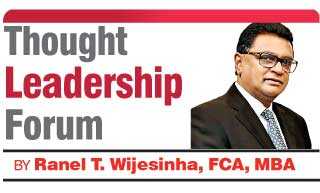 |
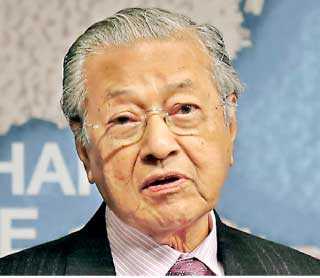 |
| Former Prime Minister of Malaysia Dr. Mahathir Mohamad |
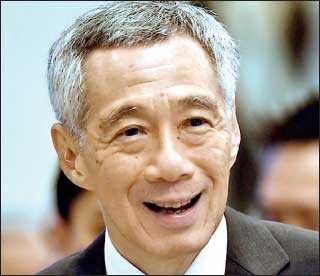 |
| Singaporean PM Lee Hsien Loong |
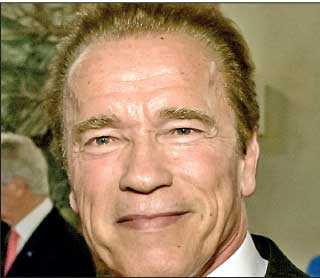 |
| Former Governor of California Arnold Schwarzenegger |
|
|
Towards a stronger economy through sustainable livelihoods and lifestyles
However, the Government begins with a weak balance sheet, a poor “business” or country economic model, and a national economic and sectoral revenue and expenditure framework, which needs review. This framework has been further weakened by COVID-19, which robbed the President of the opportunity to hit the ground running, to design, implement, and execute a program he might have had in mind since winning the Presidential Elections in November 2019, almost 8 long months ago. The mandate on 5 August then is to recover from the coronavirus as well as to strengthen the economy and to provide the nation’s people – in particular those in the middle and lower middle income-earning segment of the country – with a better lifestyle. That of course must be a lifestyle which is sustainable.
Towards sustained political stability
Sustainable economic strength is not possible without sustained political stability. The people have given a mandate for political stability to a single party, rather than stability which has hitherto been gained through yielding to the “ransom” of communally-grouped minority parties. However, this mandate must not be taken for granted. The mandate must be respected, cherished, and nurtured, rather than abused or misused. The mandate must be leveraged to build bridges with and endear the “non-Sinhala Buddhist minority” to the Government. The communally-grouped minority parties on the other hand must also realise that they too have been given a message. Major political parties who have fielded persons from minority communities, and who have nominated National List Members from minority communities have set an example.
Towards essential national harmony - a role for professions, business and civil society too
The message the electorate has given is not to the Government alone. It is also not restricted to the Parliament, which includes the Opposition. It extends to the professions, business and civil society –to professional associations, chambers, and us all. The time has come for a “collective.” The thoughts in this article are not without precedent. It is more than two and a half decades ago that I have presented these thoughts to my profession, when I said in the early nineties that we should not, as professionals, live in isolation of the problems in the North and East, or the unrest in the South. In fact the words I used then were that “we professionals cannot be passive passengers in a nation’s onward journey, moving only to the ebb and flow of our own rhythm, but have to be proactive participants.”
Mahathir Mohamad, CIMA Global Leaders’ Summit - 2005
At this point let me introduce the words of Dr. Mahathir Mohamad of Malaysia, who recognised the need for social cohesion as a fundamental ingredient, in a successful nation. At the 2005 CIMA Global Leaders’ Summit at the BMICH, Dr. Mahathir Mohamad said:
“Without stability, nothing would grow. Ethnic difference is usually enough to create tension in the relations between the races, but with all the other differences and in particular the disparities in wealth; tension and confrontation between the races would seem inevitable. Violence is very common in multi-racial societies. So, early during the struggle for independence, the founding fathers worked out a system of sharing both political power and economic wealth. The philosophy is very simple. If one race grabs all political or economic power for itself there would be strong antagonism from the other races, there would be political instability and there would be violent confrontations. No economic growth or development could take place.” End of quote.
My persistent passion, to see a nation in harmony: thoughts of a decade ago
It was Prajeeth Balasubramaniam who requested that I contribute an article to the “Old Boy” – a newsletter of that “College by the Sea.” I promised but left soon after on a month-long overseas trip to the US, England, Scotland and Northern Ireland. The article was due before I was due back. My mind was a blank as to what I should write. His repeated text reminders made me think as I travelled. On one morning, a possible caption for the article flashed through my mind. The rest of the content flowed easily. That article was published in the “Old Boy” in December 2009. I thought I will reproduce that caption, and just a few extracts of my thoughts therein given its relevance, to urge the new Government to be conscious of the need to set the right tone as we move upward, onward, and forward as a nation:
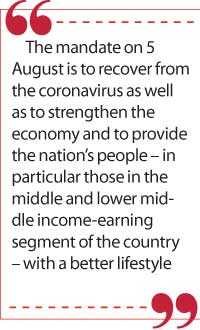 |
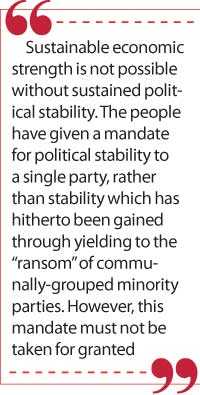 |
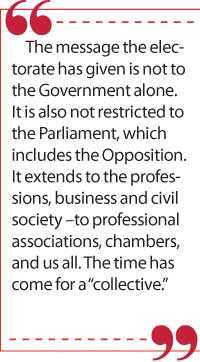 |
|
|
Leveraging a new future for the next generation
While overseas in mid-2009, I often envisioned the future of a potentially new Sri Lanka. My mind went to our very own next generation – a generation which had been robbed of its rightful future for decades; a generation which had left the country to build careers, families and adopted homes offshore.
California and Governor Schwarzenegger - independence of governance vs. falling back on the centre
While In San Diego in mid-2009, a year after the Global Financial Crisis, I wondered why those who have opportunities such as in the USA for example, take it for granted only to be driven by greed and self-interest, to self-inflict damage to such otherwise enabling environments. San Diego was a distinct joy to visit, but the State of California was now bankrupt. It was only a couple of months before my visit that I had heard that California Governor Arnold Schwarzenegger had been passionately appealing to US Treasury Secretary Timothy Geithner for a Federal bailout, from TARP (Troubled Asset Relief Program) funds earmarked for failing banks! (Very much unlike the Arnold Schwarzenegger we see in the movies). I cite this example since in the current context of Sri Lanka, it prompts one to think of the independence of governance, states have but their fall back on the centre or Federal Government at times of need!
Inverness, Scotland; post-conflict Belfast, Northern Ireland
While on the same trip, in the course of enjoying the abundant beauty and tranquillity of Inverness in the mountain highlands of Scotland, I envisioned what Nuwara Eliya could well have been today, if we were a conflict-free nation attracting annual new investments for tourism. Then I travelled to Belfast in Northern Ireland, and was encouraged by the significant new investment and new thinking that is readily apparent there. Yes, of course, 10 years after the Good Friday Agreement, the conflict is yet not completely over there. But Northern Ireland has in relative terms become a peaceful and stable destination for tourism, investment, and living.
Moving from one city to another across continents, and retrieving my email along the way, I was encouraged by the words of Singapore’s Prime Minister Lee Hsien Loong in a National Day speech he had delivered in August 2009.
Singapore PM’s National Day speech - an opportunity to strengthen our social compact
He said, and I quote, “We didn’t start out as one people. Our forefathers were different peoples from different lands, who had come to Singapore to seek better lives for themselves and their children. But our formative years fighting for independence, then striving as a new nation to survive against the odds, brought us all closer together. Each time we were challenged, we responded as one, everyone pulling together and working for the common good. And each success further cemented our cohesion, and helped us to meet the next challenge. We are doing this again in this crisis. Every one of us – Government and people, employers and unions – is working together, keeping companies viable and competitive, preserving jobs and livelihoods, and enhancing social safety nets like Workfare and ComCare. This crisis may be a severe test, but our history and record gives us confidence that we will once again turn it into an opportunity to strengthen our social compact, and upgrade our economy.”
Fighting the recession or the Avian Flu - bridging potential divides; unity is key to success
Referring to the recent global meltdown, he said, “Whether fighting the recession or the flu, we made sure every Singaporean knows he’s not alone, but that the community and country are behind him. So long as you make the effort and do your best, the rest of us will help you to pull through. This unity is key to our success in many fields. We must work hard to strengthen it, and to bridge potential divides within our society, be it between Singaporeans and new arrivals, between rich and poor, or most fundamental of all, between the different races and religions.”
Enlarging the secular common space - building trust and harmony between our communities
Addressing issues of social cohesion, he had this to say, “We often see ethnic strife and religious conflict in other countries. In Singapore we have to respect each other’s cultures, practices and beliefs, build trust and harmony between our communities, and gradually enlarge the secular common space which all groups share. In this way, we can become one people, one nation, one Singapore. We are well-placed to deal with these challenges. We are not just pursuing economic growth, or strengthening our society, or remaking our city, but creating a new Singapore. In the half-century since we attained self-government, we’ve been tested many times, but we’ve also created many possibilities for ourselves. Let us stand shoulder-to-shoulder, so that whether it rains or shines, we can work together and achieve the best results for Singapore. This is how we build a better and more vibrant nation, and make Singapore a special place that we are all proud to call our home.”
These words of wisdom of Singapore’s Prime Minister Lee are a potent message to all - whether in Government or in Opposition, in business or in the professions or simply representatives of civil society, whether Tamil or Sinhala or Muslim, Malay or Burgher; whether it is the diaspora offshore or our people on-shore. Based on the thoughts of these global leaders, here is what I had to say:
Turning the searchlight inwards - agents of terrorists or “triumphalists”
A new realisation must awaken those who live in the luxury and in the comfort zones of their adopted homes offshore, while investing their minds and money or simply their time in influencing thinking in order to perpetuate conflict. Whether they are Tamil or Sinhala, they should now in particular turn the searchlight inwards to see how they can invest their minds and money to be catalysts for change for the better, rather than be agents of terrorists or “triumphalists.”
End of extracts of the “Old Boy” with my appreciation to the OBA of S. Thomas’ College Mt. Lavinia, for the opportunity and the space to write, and Prajeeth Balasubramaniam, for his calm and perseverance in reminding me while I was travelling, not knowing what I would write and whether I would write at all. If not for Prajeeth, and the thoughts which triggered in me through “on-site insights through travel”, my journey of learning will not have been as rich.